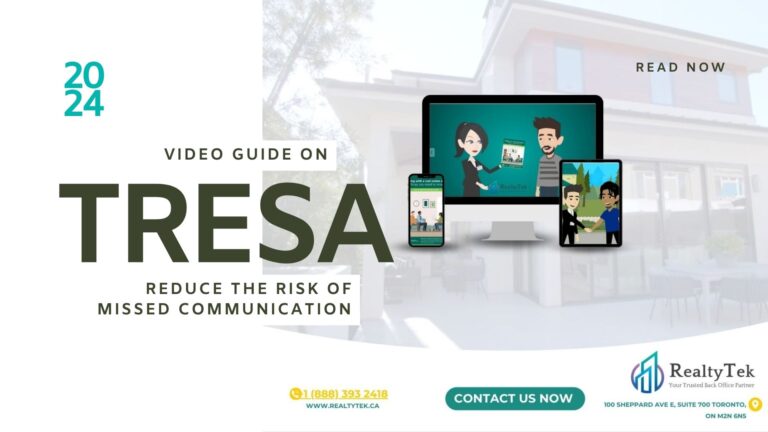Deal Processing Requirements in TREB
If you’re a brokerage owner or manager in the bustling Toronto real estate scene, you’re likely searching for ways to stay competitive and boost your bottom line. You can process more deals faster by outsourcing them. Reduce technology expenses by negotiating for better rates or increase revenue per agent by gaining insights into their performance trends.
These strategies are not just theoretical concepts, but practical solutions that can transform how you manage your brokerage. They are feasible and can be implemented in your business.
In this article, we will provide you with comprehensive guidance on the requirements for Deal Processing laid out by the Toronto Real Estate Board (TREB). You can rely on us to help you navigate through these requirements. Read on.
Table of Contents
1. The most prominent real estate boards in Canada
2. Processing residential deals: requirements and timelines
3. Commercial Deals Processing Requirements and Timelines
4. Builder Deals Processing. Requirements and Timelines
While there isn’t an official ranking system for real estate boards in Ontario, here are some of the largest based on membership and market influence: Depending on when you access this article, some brokerages would have merged or gone through changes.
- Real Estate Brokerages in Ontario
- Toronto Regional Real Estate Board (TRREB) https://trreb.ca
- Ottawa Real Estate Board (OREB) https://www.oreb.ca
- Barrie & District Association of REALTORS® (BDAR) https://www.bdar.ca
- London and St. Thomas Association of REALTORS® (LSTAR) https://www.lstar.ca
- Kitchener-Waterloo Association of REALTORS® (KWAR) https://kwar.ca
- Cornerstone Association of REALTORS (Cornerstone) https://www.cornerstone.inc
- Niagara Association of REALTORS® (NAR) https://www.niagararealtor.ca
- Oakville, Milton, and District Real Estate Board (OMDREB) https://omdreb.ca
- Windsor-Essex County Association of REALTORS® (WECAR) https://windsorrealestate.com
- Sudbury Real Estate Board (SREB)
- Peterborough and the Kawarthas Association of REALTORS® (PKAR) http://www.peterbororealestate.com/?referrer=kawarthaNOW
- Kingston and Area Real Estate Association (KAREA) https://karea.ca
- Quinte & District Association of REALTORS® Inc. (QDAR)
- Brantford Regional Real Estate Association (BRREA) https://www.brrea.com
- Guelph and District Association of REALTORS® (GDAR) https://www.gdar.ca
- Cornwall and District Real Estate Board (CDREB) https://mls-cornwall.com
- North Bay Real Estate Board (NBREB) https://www.nbara.ca
- Chatham-Kent Association of REALTORS® (CKAR) Chatham-Kent Association of REALTORS
- Huron Perth Association of REALTORS® (HPAR) http://www.hpar.ca
- The Woodstock Ingersoll Tillsonburg & Area Association of REALTORS (WITAAR) https://witaar.ca
- Kawartha Lakes Real Estate Association Inc. (KLREA) https://kawarthalakes-mls.ca
- The Lakelands Association of REALTORS® (The Lakelands)® https://thelakelands.ca
- The Central Lakes Association of REALTORS® (CLAR) https://www.clar-mls.ca
- Bancroft and Area Association of REALTORS® (BAAR) https://www.bancroftrealestate.com
Let’s examine some vital requirements for processing deals in TREB. This article will highlight Residential, Commercial, and Builder Deal Processing requirements.
- Processing Residential Deals in TREB: Requirements, Time Limits & Resources
The Toronto Real Estate Board (TREB) sets specific guidelines for processing residential deals. Here’s a breakdown of the critical requirements, time limitations, and relevant resources:
2.1 Residential Deals Processing Requirements
- TREB (Toronto Real Estate Board) Standard Offer Presentation Form
A mandatory form used to submit offers on properties listed on the TREB MLS System.https://trreb.ca/
2. Deposit Requirements
The minimum deposit on a real estate transaction in the TREB jurisdiction is typically 5% of the purchase price. However, there can be exceptions based on negotiation and agreements between buyer and seller.https://trreb.ca/
3. Subject Clauses:
Standard subject clauses in TREB transactions include financing, Inspection, and status certificate (condominiums).https://www.getwhatyouwant.ca/the-financing-condition-what-you-need-to-know
4. Closing Documentation
The closing process typically involves a lawyer or notary public, who will handle the transfer of title, registration of the property, and disbursement of funds.https://trreb.ca/
5. Standard Offer Presentation Form: This mandatory form is used to submit offers on properties listed on the TREB MLS System. (https://trreb.ca/)
6. Agreement of Purchase and Sale (APS): This legally binding contract outlines the terms and conditions of the sale, including price, closing date, and subject clauses.
7. Subject Clauses:
- Financing allows the buyer to withdraw from the deal if they cannot secure funding for the property within a specified timeframe (usually 5-17 business days).
- Inspection: This gives the buyer time to conduct a thorough inspection of the property and potentially request repairs based on the findings. Inspect timeframes can be negotiated and typically range from 2 to 7 days.
- Status Certificate (Condominiums): Applicable to condominium purchases, this document provides vital information about the condo corporation’s financial health, upcoming maintenance costs, and potential legal issues. Timeframes for obtaining a status certificate can vary depending on the condo corporation but typically range from 5-10 business days.
- Time Limitations:
- Offer Presentation: Sellers have a reasonable amount of time to consider offers, but TREB doesn’t specify a strict timeframe.
- Acceptance/Rejection: Once an offer is accepted, the buyer has a set period (usually 24 hours) to remove any subject clauses and finalize the agreement.
- Subject Removal: Timeframes for removing subject clauses like financing and Inspection are typically negotiated and outlined in the APS.
- Closing: Closing dates can vary depending on various factors. However, TREB recommends at least 30 days between offer acceptance and closing to allow for necessary legal and financial processes.
- Commercial Deal Processing requirements in TREB
Processing commercial deals in TREB involves a more complex process than residential transactions. Here’s a breakdown of the critical requirements, timelines, and documentation:
3.1 Requirements and timelines for commercial deals processing:
- TREB Membership
The privilege of being a licensed commercial real estate agent and a member of TREB grants you exclusive access to the MLS system for commercial listings.
2. Commercial MLS System Access:
Commercial agents need access to the TREB Commercial MLS System, which requires separate registration and fees.
Specialized knowledge of market conditions, lease structures, zoning regulations, and financing options is essential for negotiating commercial leases and sales. Understanding the timelines is crucial, as they vary based on the deal’s complexity.
3. Marketing & Showings:
Depending on size and type, marketing a commercial property can take longer than marketing a residential property. Allow 4-8 weeks or more for qualified leads.
4. Offer Presentation & Negotiation:
Commercial deals can involve complex considerations and may take longer than residential transactions. Timeframes can vary significantly depending on the complexity of the agreement.
5. Due Diligence:
Buyers will need ample time for thorough due diligence, including inspections, legal reviews, and financial analysis. This comprehensive process can take 4-8 weeks, ensuring a secure transaction.
6. Closing:
The closing process for commercial transactions typically involves more complex legal documents and may take longer than residential closings. Allow 4-6 weeks or more.
7. Documentation & Legal Forms (May vary based on the specific deal):
- Standard Offer to Purchase (Commercial): TREB provides a standard form specifically for commercial transactions, which differs from the residential form.
- Lease Agreement: For lease transactions, a comprehensive lease agreement outlining terms, rent, tenant obligations, and termination clauses is required.
- Legal Documents: Commercial deals will likely involve legal documents such as title searches, environmental reports, and zoning certificates.
- Financial Documentation: Including financial statements for tenants and buyers, loan approvals, or proof of funds for purchase is a testament to the diligence and responsibility required in commercial transactions.
- Builder Deal Processing requirements in TREB
The Builders Deal process involves several critical steps, from initial documentation to final settlement. Understanding these stages is crucial for builders and buyers to ensure a smooth transaction. Here’s a detailed breakdown of the critical components:
4.1 Documentation Requirements
- Purchase Agreement: A legally binding contract that outlines the terms and conditions of the sale, including property details, purchase price, and completion date. https://www.cmhc-schl.gc.ca/en/consumers/home-buying/buying-guides/new-construction
- Floor Plans and Specifications Detailed drawings and descriptions of the property, including room layouts, dimensions, and finishes. These documents form part of the contract and should be carefully reviewed. https://www.tarion.com/homeowners/your-pre-delivery-inspection
- Construction Schedule: A timeline outlining the expected construction progress, including major milestones and the anticipated completion date. https://www.canadianrealestatemagazine.ca/news/what-to-look-for-in-preconstruction-contracts-334309.aspx
- Disclosure Statement: A comprehensive document detailing all material facts about the property, including potential risks, shared facilities, and any other relevant information. Required by law in many jurisdictions. https://www.ontario.ca/laws/statute/98c19#BK162
- Warranty Information Documentation outlining the builder’s warranty on the property, including coverage details and duration. https://www.tarion.com/homeowners/your-warranty-coverage
- Builder’s License and Insurance Proof of the builder’s licensing and insurance coverage, ensuring they are qualified and protected to undertake the construction. https://www.ontario.ca/page/ontarios-new-home-warranties-and-protections
- Environmental Assessments Reports on the property’s environmental condition and surrounding area, including potential hazards or concerns. https://www.canada.ca/en/services/environment/conservation/assessments.html
4.2 Final Settlement Process
- Installment Payments Most builder deals involve a series of payments made at various stages of construction. Ensuring these payments are completed is crucial for the smooth progression of the agreement.
- Deposit: Typically 5-10% of the purchase price, paid upon signing the purchase agreement. https://www.ratehub.ca/blog/deposits-when-buying-a-house/
- Construction Milestones: Payments tied to specific stages of construction (e.g., foundation completion, framing, etc.).
- Occupancy Fees: In some cases, especially for condominiums, buyers may need to pay occupancy fees before the final closing. https://www.getwhatyouwant.ca/interim-occupancy-fees-explained
- Final Inspection: A thorough examination of the completed property to ensure it meets all specifications and quality standards.
- Pre-Delivery Inspection (PDI): A walkthrough of the property with the builder to identify any deficiencies or issues. https://www.tarion.com/homeowners/your-pre-delivery-inspection
- Deficiency List: A document listing any identified issues the builder must address before or after closing.
4.3 Closure
The final stage of the transaction is where ownership is transferred from the builder to the buyer.
- Title Transfer: Legal documents transferring ownership of the property.
- Mortgage Documentation: If applicable, finalize all mortgage-related paperwork.
- Statement of Adjustments: A detailed financial statement outlining all credits and debits related to the property transfer.
- Utilities Transfer: Arranging for the transfer of utilities into the buyer’s name.
- Key Handover: The physical transfer of property access to the buyer.
4.4 Time Limitations
- Construction Completion varies depending on the project size and complexity, typically ranging from 6 months to 2 years for single-family homes and potentially longer for larger developments.
- Final Inspection: Usually conducted 1-2 weeks before closing.
- Deficiency Rectification: Minor issues are typically addressed within 30 days of closing, while significant issues may require immediate attention.
- Closing Process: It generally takes 1-2 days to complete all necessary paperwork and fund transfers.
- Warranty Claims: Most jurisdictions provide a tiered warranty system, with coverage for different aspects of the home ranging from 1 to 7 years. https://www.tarion.com/homeowners/your-warranty-coverage/warranty-outline
By carefully managing each stage of the Builders Deal process, from comprehensive documentation to meticulous final settlement procedures, builders and buyers can ensure a successful and satisfactory transaction. It’s crucial to stay informed about local regulations and seek professional advice when navigating the complexities of new construction purchases.
- RealtyTek Deals QC Program
In the fast-paced world of real estate, maintaining high quality and compliance standards is paramount. RealtyTek’s Deals Quality Control (QC) program ensures that every transaction is handled with the utmost precision and care. Let’s delve into the critical components of this comprehensive program:
- Maintaining Accuracy & Compliance
Our QC program’s heart is an unwavering commitment to accuracy and compliance. Real estate transactions are subject to complex legal and regulatory requirements. Our program is meticulously designed to:
- Stay up-to-date with the latest legal and regulatory changes in the real estate industry
- Implement rigorous checks and balances to ensure all transactions meet or exceed compliance standards
- Utilize advanced software tools to automate compliance checks where possible
- Regularly consult with legal experts to interpret and apply complex regulations correctly
- Standardization Through Templates and Guidelines
To streamline our processes and minimize errors, we’ve developed a robust system of templates and guidelines:
- Document Templates: We’ve created a comprehensive library of templates for all mandatory documents involved in real estate transactions. These templates are regularly updated to reflect the latest legal requirements and best practices.
- Data Entry Guidelines: Our detailed guidelines for data entry ensure consistency across all transactions. These guidelines cover everything from client information input to property details and financial data.
- Document Handling Protocols: We’ve established clear protocols for document management, including naming conventions, storage procedures, and access controls. This ensures that all sensitive information is handled securely and efficiently.
- Staff Development
A well-trained team is the backbone of any successful QC program. Our staff development initiatives include:
- Regular Training Sessions: We conduct frequent, comprehensive training sessions on:
- QC procedures specific to real estate transactions
- Best practices in data handling and document management
- Customer service excellence in the context of QC
- Compliance Updates: Our team stays informed through:
- Monthly compliance newsletters
- Quarterly compliance workshops
- Access to an online compliance resource center
- Continuous Improvement Through Audits and Reviews
To ensure our QC program remains practical and up-to-date, we:
- Conduct regular internal audits of our QC processes
- Engage external experts for periodic reviews of our QC program
- Implement recommendations from both internal and external reviews promptly
- Encourage feedback from all team members to identify areas for improvement
- Comprehensive Reporting
Our reporting system is designed to provide clear insights and maintain accountability:
- Regular QC Activity Reports: We generate detailed reports that cover:
- Number of transactions processed
- Compliance rates
- Common issues identified
- Corrective actions taken
- Management Updates: We keep our management team informed through:
- Monthly executive summaries of QC performance
- Quarterly in-depth QC review presentations
- Ad-hoc reports on significant findings or trends
- Record Keeping: We maintain comprehensive records of all QC activities, including:
- Audit trails of all transactions
- Documentation of corrective actions
- Training session logs and attendee records
- External review reports and implementation plans
By implementing this robust QC program, RealtyTek ensures that every real estate transaction is handled with the highest accuracy, compliance, and professionalism standards. This protects our clients and partners and reinforces our position as a trusted leader in the real estate industry.
Additional Resources:
- TREB Website: (https://trreb.ca/)
- OREA (Ontario Real Estate Association): (https://www.orea.com/)
Important Note:
- This information is intended as a general overview. It’s crucial to consult with a qualified real estate professional for specific advice on processing residential deals in the TREB market.
- Timeframes and specific requirements might be subject to change. Always refer to the latest guidelines provided by The relevant Real Estate Board.
About RealtyTek
With over 25 years of experience in the Toronto real estate market, they understand the importance of human connection alongside innovative technology. Their suite of real estate back-office services empowers brokerages to streamline operations, improve agent productivity, and provide exceptional client service. To learn more about how RealtyTek can help your brokerage thrive in the face of a changing market, visit their website: https://www.realtytek.ca/














